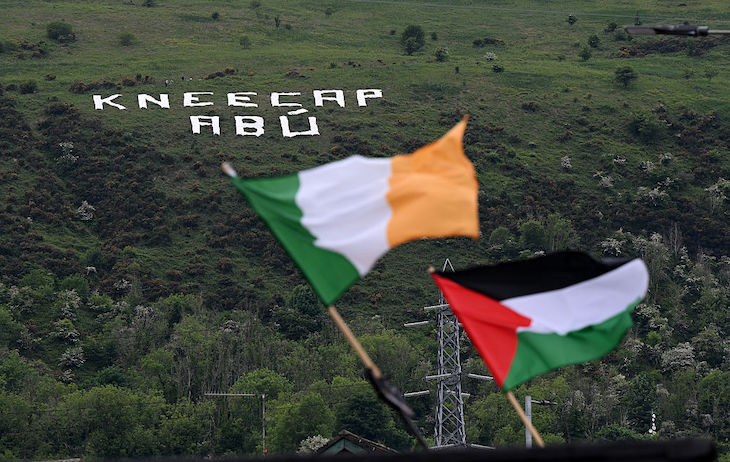For the past twenty years, Ireland has been Europe’s improbable overachiever. A small island nation on the fringe of Europe managed to turn EU membership, American corporate investment and allegedly shrewd strategic diplomacy into an economic success story. While the Celtic Tiger whimpered following the 2008 crash, it leapt back into action with remarkable agility, creating a low-tax, free-market economy. Dublin became the unlikely bridge for American tech and pharmaceutical giants to meet the European market, a centre of financial services and an agile diplomatic operator.
As the US counts costs, not cousins, Ireland’s mix of moral posturing and strategic freeloading will wear ever thinner
Throughout the Biden years, Ireland had an uncanny ability to make everyone believe they were getting a good deal from their Irish ties, despite defence and economic free-loading. But as Donald Trump recalibrates American diplomacy, Ireland’s luck may finally be running out.
From the mid-1990s, the Irish model was a study in highly successful strategic opportunism. Low corporate tax rates and access to the European market attracted US multinationals eager to offshore their profits and lower operating costs. Dublin became the consummate insider-outsider, playing the game enough by the rules to benefit, but bending them enough to profit. Its diplomats managed to keep Washington and Brussels onside, preserving lucrative sweetheart tax arrangements while wrapping themselves in the comforting rhetoric of a small, neutral nation. Scratch a little further, and this neutrality quickly becomes feather-feeling and soft diplomacy to regimes such as Tehran and Caracas.
The Irish model, predicated on being a tax haven, is now under unprecedented strain. The current US Administration’s explicit aim of re-shoring American industry, rebalancing trade deficits and maximising Treasury income has imperilled the very system which facilitated Irish prosperity. US secretary of commerce Howard Lutnick has branded Ireland ‘his favourite tax scam’ and Trump has bemoaned its ‘massive’ trade imbalance. The numbers are startling: between 2014 and 2021, the value of intangible assets held in Ireland soared from under $400 billion (£300 billion) to nearly $1 trillion (£760 billion). Ten American companies account for 60 per cent of all Irish corporate tax revenue.
The Trump Administration’s efforts to address the American trade deficit have made this strain even more acute. Despite the apparent reprieve of blanket 15 per cent rate tariffs on EU goods, concerns amongst Irish economists and politicians are swirling. The two greatest pillars of the Irish model, pharmaceuticals and tech, are particularly exposed. The effects could be even more devastating if Section 232 tariffs – which allows tariff increases on national security grounds and have recently been slapped on US steel and aluminium imports – are introduced.
The problem is not just economic, as Policy Exchange’s report, Peak Ireland? Ireland’s Diplomatic Challenges and the Lessons for the UK, reveals. The US president’s expectation that European partners support their own defence stands in stark contrast to Ireland’s wafer-thin defence budget of 0.2 per cent of GDP. This is less than Malta. For decades, Ireland has free-loaded on defence, even as Russian submarines prowl the vital undersea cables that run through its waters.
As ambassador Robert O’Brien, former national security adviser to president Trump, has written: ‘The Trump administration and the American people expect better burden sharing from our allies and partners…despite its professed neutrality, Ireland pursues an increasingly activist foreign policy that is marked by its divergence from everything the Trump administration stands for.’
And yet, even as its vulnerabilities mount, Ireland has chosen this moment to speak out on the world stage – again, completely at odds with the US.
It holds one of Europe’s lowest voting coincidence rates with the US at the United Nations, particularly on issues related to Israel. The growing tide of anti-Israelism within Irish politics has attracted scrutiny from Washington. Legislation boycotting goods from Israeli settlements, for example, provoked bipartisan condemnation in Congress. Senator Risch has described Irish foreign policy as a ‘baffling mess’ in which ‘Iran seems to get warmer treatment…than Israel’, leading it down a ‘hateful, antisemitic path.’ One recent bipartisan letter went further, warning that Ireland’s one-sided stance would ’empower Hamas terrorists and embolden anti-Semitism.’ Frustration from both sides of the aisle demonstrates that Ireland’s special access in Washington is fading.
Lest we think this phase will pass, Ireland’s European partners have also lost patience. Ireland’s tax policies are no longer whispered in Brussels, but announced in court as domestic economic pressures grow within the EU. Is Britain, in the name of civilised Anglo-Irish relations, going to be the only country left standing to pick up the bill for Ireland’s defence in the air, sea and sub-maritime domains?
The Irish government’s new catechism is moral grandstanding at the expense of strategic prudence. Nowhere is this strategically self-defeating posturing clearer than in Friday’s election of Catherine Connolly. The Irish president elect’s characterisation of the US as an untrustworthy ‘imperial power’ and description of neutrality as ‘one of the most important policies that we have’ suggest that Ireland has little appetite for course-correction.
Ireland’s position was always built on sentiment and sleight of hand. For years, deft diplomacy masked deep rifts with Washington on tax, trade, defence and foreign policy, but that will not wash in an age of conditional diplomacy. As the US counts costs, not cousins, Ireland’s mix of moral posturing and strategic freeloading will wear ever thinner. The easy familiarity has disappeared. Unless Dublin aligns its interests with Washington’s, its luck may finally run out.







Comments